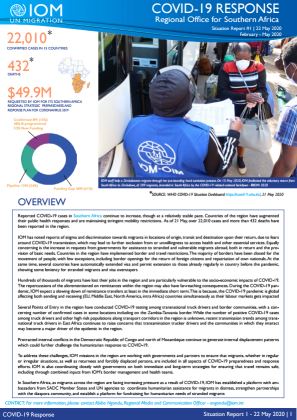-
Countries
-
Data and Analysis
-
Special Focus
-
Crisis Responses
IOM Southern Africa Covid 19 Response - Situation Report 1 (Feb - May 2020)
Reported COVID-19 cases in Southern Africa continue to increase, though at a relatively stable pace. Countries of the region have augmented their public health responses and are maintaining stringent mobility restrictions. As of 21 May, over 22,010 cases and more than 432 deaths have been reported in the region. IOM has noted reports of stigma and discrimination towards migrants in locations of origin, transit and destination upon their return, due to fears around COVID-19 transmission, which may lead to further exclusion from or unwillingness to access health and other essential services. Equally concerning is the increase in requests from governments for assistance to stranded and vulnerable migrants abroad, both in return and the provision of basic needs. Countries in the region have implemented border and travel restrictions. The majority of borders have been closed for the movement of people, with few exceptions, including border openings for the return of foreign citizens and repatriation of own nationals. At the same time, several countries have automatically extended visa and permit extension to those already regularly in country before the pandemic, showing some leniency for stranded migrants and visa overstayers Hundreds of thousands of migrants have lost their jobs in the region and are particularly vulnerable to the socio-economic impacts of COVID-19. The repercussions of the aforementioned on remittances within the region may also have far-reaching consequences. During the COVID-19 pandemic, IOM expect a slowing down of remittance transfers at least in the immediate short term. This is because, the COVID-19 pandemic is global affecting both sending and receiving (EU, Middle East, North America, intra Africa) countries simultaneously as their labour markets gets impacted Several Points of Entry in the region have conducted COVID-19 testing among transnational truck drivers and border communities, with a concerning number of confirmed cases in some locations including on the Zambia-Tanzania border. While the number of positive COVID-19 cases among truck drivers and other high risk populations along transport corridors in the region is unknown, recent transmission trends among transnational truck drivers in East Africa continues to raise concerns that transamination trucker drivers and the communities in which they interact may become a major driver of the epidemic in the region. Protracted internal conflicts in the Democratic Republic of Congo and north of Mozambique continue to generate internal displacement patterns which could further challenge the humanitarian response to COVID-19. To address these challenges, IOM missions in the region are working with governments and partners to ensure that migrants, whether in regular or irregular situations, as well as returnees and forcibly displaced persons, are included in all aspects of COVID-19 preparedness and response efforts. IOM is also coordinating closely with governments on both immediate and long-term strategies for ensuring that travel remains safe, including through combined inputs from IOM’s border management and health teams. In Southern Africa, as migrants across the region are facing increasing pressure as a result of COVID-19, IOM has established a platform with ambassadors from SADC Member States and UN agencies to coordinate humanitarian assistance for migrants in distress, strengthen partnerships with the diaspora community, and establish a platform for fundraising for humanitarian needs of stranded migrants.

